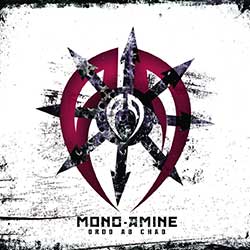Published by Alessandro Violante on May 17, 2016
 The fact that Joost Gransjean, known as Mono-Amine, is Dutch it’s undoubtful. This can be understood even only by listening to the first sounds of his new album Ordo Ab Chao, released on 15th April by Vendetta Music, an album that confirms, in case it was still necessary, the quality of a musician whose obsession is the research for the perfect beat. Ordo Ab Chao is a work that can be interpreted in multiple ways.
The fact that Joost Gransjean, known as Mono-Amine, is Dutch it’s undoubtful. This can be understood even only by listening to the first sounds of his new album Ordo Ab Chao, released on 15th April by Vendetta Music, an album that confirms, in case it was still necessary, the quality of a musician whose obsession is the research for the perfect beat. Ordo Ab Chao is a work that can be interpreted in multiple ways.
It isn’t simply a very good rhythmic industrial album that meets Dutch hardcore techno-driven tempos, sounds, distortions and rhythms, but also an album that in its title quotes Freemasonry and that, sometimes, speaks to people using the imperative verb form (Question authority doesn’t leave space to interpretations), trying to wake up consciences (a thing that industrial music has tried to do in several ways since it’s early days,).
Quoting Burroughs, here the element that breaks the “control systems” can be identified with the endless powerful rhythms that transform themselves without pauses, sometimes linked with each other by a particular taste for the collage pratice. In particular, it’s the case of the early songs that initially can sound a bit stiff, but then show themselves uncompromised in their pride. Chaos by its definition is an example of classic rhythmic industrial music, in which the magniloquent strongly ’90s-influenced distortion is the most important element of the song. It sounds monolithic and it’s the leitmotif of the whole song, alternated with a very rough beat (the result of a strongly rough production) upon which stands a malicious punk riffing. Also the more granitic and particularly heavy Order out of chaos shares the same use of electric guitar riffing aimed at expressing heaviness. It’s another rhythmic industrial song that alternates different variations on the musical structure and in which the beat has definitely a main role.
Distortions and hardcore techno-driven tempos are present in the faster episodes such as Eleutheromania and, in general, in most part of songs subsequent to Question authority, which define a musician whose approach is different from that used by his German and Belgian colleagues. But short hardcore techno influences can be found in all songs, in a lesser or major extent, in the use of distortions that are typical of the early phase of the genre (from the first years until approximately 1999). Interesting rhythmic variations are main elements in Statism is an ideology, an interesting intuition that gives a certain dynamism to a song that would use the same tempo again and again for its whole duration without it. This neverending alternation of different tempos and rhythms is one of the main reasons, and although sometimes the songs are quite long, they never bother the listener nor do they sound ordinary.
Subsequently to the already quoted Question authority, the rhythm becomes progressively faster, less granitic and thinner, less cerebral than the tribal The future must not be blindly accepted, a song that asks to be listened several times, thrusting with strenght into an imaginary dancefloor. Question authority starts with a rough European techno sound until it leaves space to more complex and dull tempos that recall some songs of Wieloryb‘s Root, but with less emphasis put on the distortion, also inserting a short hardcore passage influenced by a typical French end-of-the-millennium hardcore sound.
Polluting the mainstream is influenced by industrial hardcore, while I walk in the shadow of death recalls certain distortions closer to early frenchcore (obviously with its own characteristics, such as the sampling and typical industrial-dystopian atmospheres). At the end of the album there’s a jewel of rhythmic industrial detached from hardcore and techno tempos, Taking your control away, which seems to break the perfect four-on-the-floor spell listened until that moment, to throw us in a syncopated and very distorted rhtyhmic pattern. A particular mention has to be made for the opener, The predatory elite with its dystopic mood and its very acid synth line, and for the final song Future is a concept (ambient mix), characterized by an apocalyptic distorted mood and centered on a sampling close to Frankfurt school of thinking (The future is a concept, it doesn’t exist […] tomorrow never comes).
With Ordo Ab Chao, Mono-Amine gives us an album that attacks with strong and continous rhythms in an hand to hand assault that has very few and well-conceived pauses, put only at the beginning and at the end of the album, but also an interesting chain of thoughts about politics. That of Joost isn’t the only case of rhythmic industrial music that talks about social problems through imperative tones (Winterkälte are masters in this practice), and this is the most fascinating element of the genre: a direct linkage between instrumental music characterized by strong rhythmic connotation and a message made of slogans and important statements. A work that doesn’t innovate, but that is particularly worthy of several listening sessions.
Label: Vendetta Music
Rating: 8


